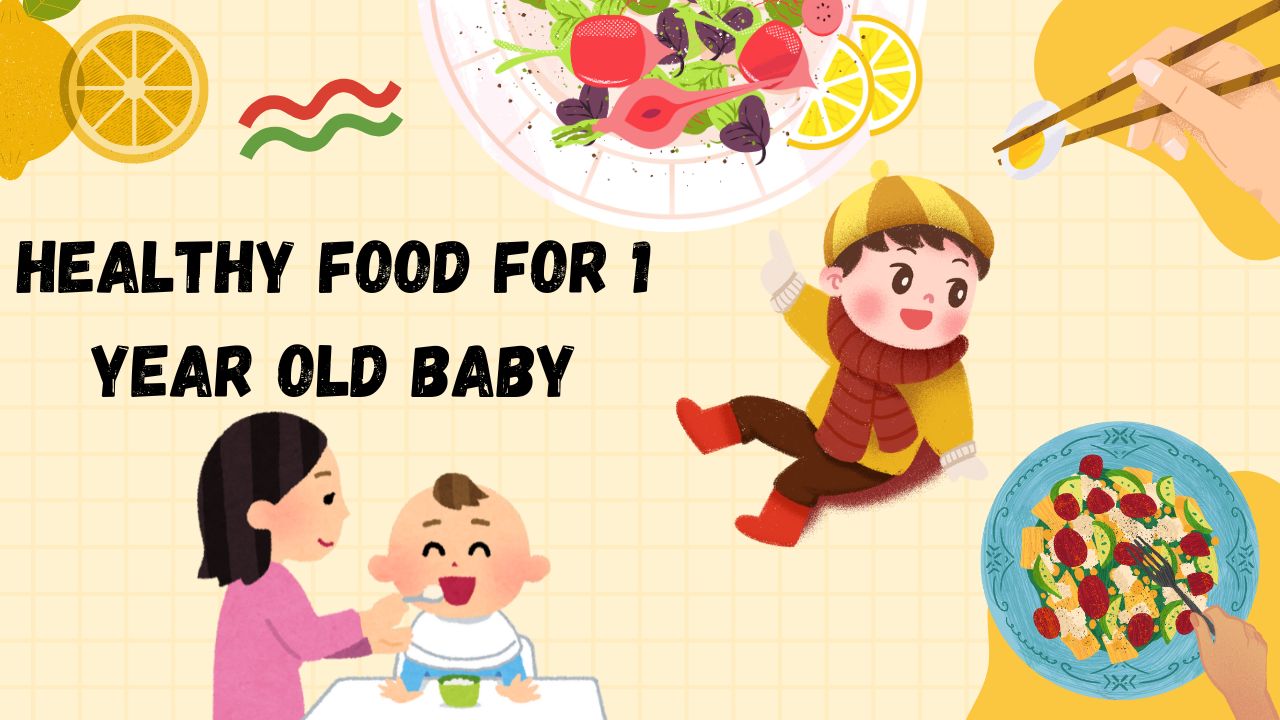Choosing the right healthy food for 1 year old baby can help them embrace new flavors and see meals as fun. Your 1-year-old is growing, changing, and discovering quickly. It’s normal for kids this age to have inconsistent food choices and a changing appetite. Make sure they’re getting the foods they need. Babies and toddlers should get about half of their calories from healthy fats, which are essential for their growth and development. Good fats, like those in avocado, olive oil, fish, nut butter, and dairy, are beneficial. However, unhealthy fats found in fried foods, fast foods, and many packaged foods should be avoided.
Healthy Food for 1 Year Old Baby
As your baby turns one, they are entering a stage of rapid growth and development. Introducing a variety of healthy and balanced meals is essential to support their nutritional needs and lay the foundation for good eating habits. In this blog, we’ll explore the best healthy food for 1 year old baby, including meal ideas, tips for feeding, and foods to avoid.
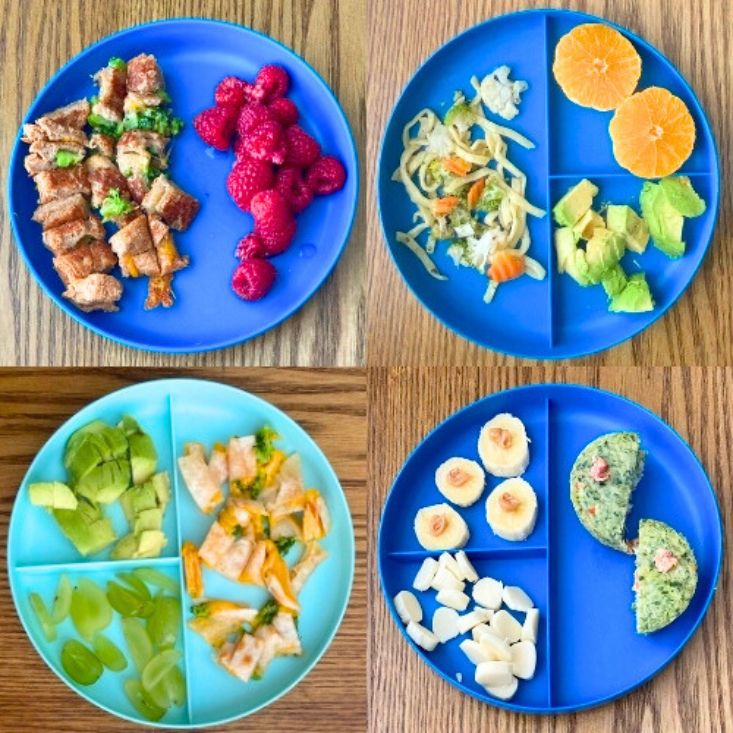
Why Healthy Food is Important for a 1-Year-Old Baby?
At this age, your baby is transitioning from breast milk or formula to more solid foods. Their body requires a balanced diet rich in nutrients to support their growing bones, brain development, and overall health. Healthy food for a 1-year-old baby includes a mix of fruits, vegetables, grains, proteins, and dairy to ensure they get all the essential vitamins and minerals.
Key Nutrients of Healthy Food for 1-Year-Old Baby
Before diving into specific foods, it’s important to understand the key nutrients your baby needs:
Protein: Supports muscle growth and tissue repair.
Calcium: Essential for strong bones and teeth.
Iron: Important for blood health and cognitive development.
Healthy Fats: Crucial for brain development.
Fiber: Helps with digestion and prevents constipation.
Vitamins and Minerals: Vitamins A, C, D, and B-complex, along with minerals like zinc, are vital for overall health.
Best Healthy Foods for a 1-Year-Old Baby
Here’s a list of some of the best healthy food options for a 1-year-old baby:
1. Fruits
Bananas: Soft and easy to eat, bananas are a great source of potassium and fiber.
Avocados: Packed with healthy fats, avocados support brain development.
Berries: Blueberries, strawberries, and raspberries are rich in antioxidants and vitamins.
Apples: Serve them cooked or finely chopped to avoid choking hazards. Apples are full of fiber and vitamin C.
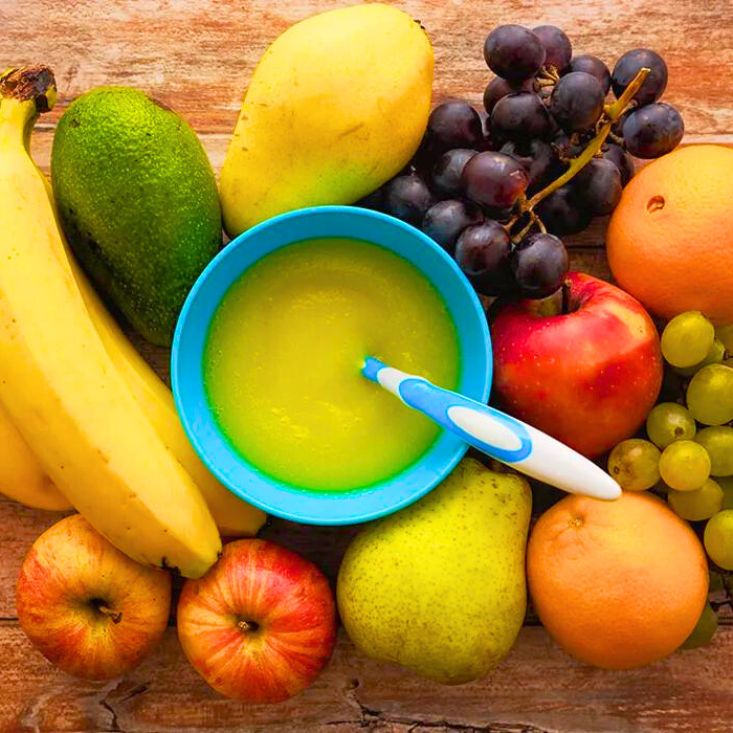
2. Vegetables
Sweet Potatoes: A good source of vitamins A and C, potatoes are also naturally sweet, which babies love.
Carrots: Cooked and mashed, carrots provide beta-carotene, which is important for eye health.
Peas: These tiny veggies are full of protein, fiber, and vitamins.
Spinach: Cooked spinach is rich in iron and calcium, crucial for a baby’s growth.
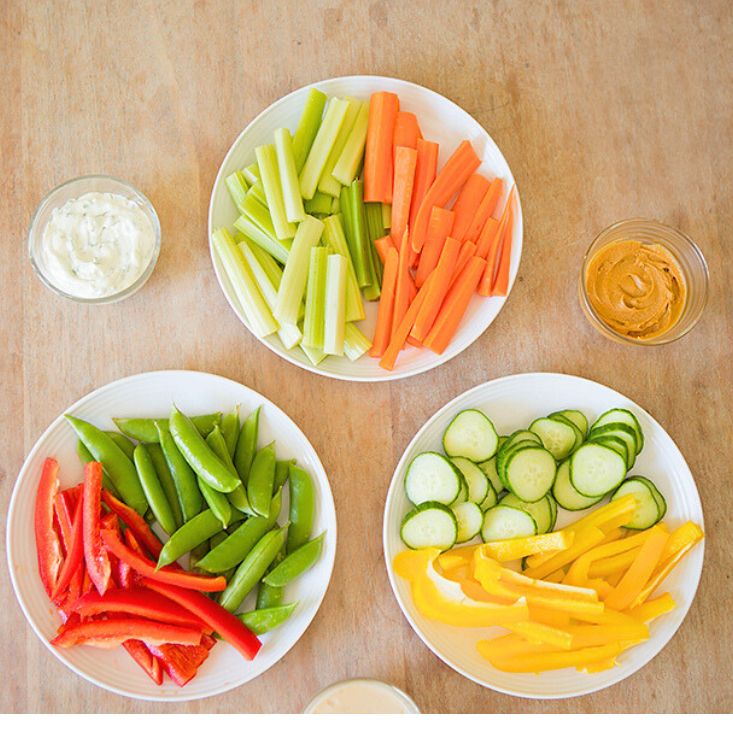
3. Grains
Oatmeal: A great source of fiber and iron, oatmeal is a healthy breakfast option.
Whole Grain Bread: Perfect for small sandwiches or toast, whole grain bread offers fiber and B vitamins.
Brown Rice: A nutritious side dish, brown rice is high in fiber and energy.
Quinoa: A protein-rich grain, quinoa is easy to digest and packed with nutrients.
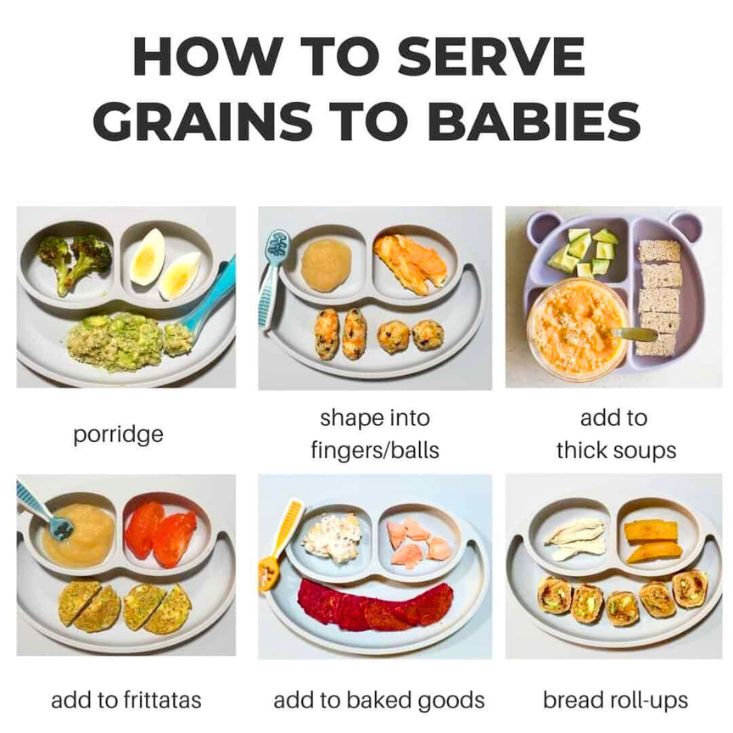
4. Proteins
Chicken: Soft, shredded chicken is a great source of protein and iron.
Eggs: Eggs are versatile and provide high-quality protein, healthy fats, and vitamins.
Fish: Opt for low-mercury fish like salmon, which is rich in omega-3 fatty acids for brain development.
Beans and Lentils: These plant-based proteins are packed with fiber, iron, and other essential nutrients.
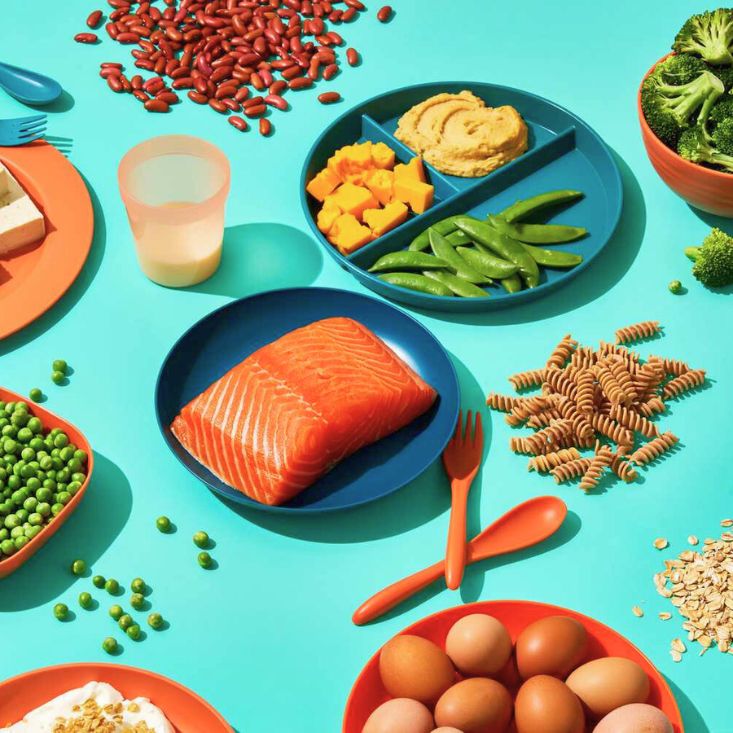
5. Dairy
Yogurt: Plain, full-fat yogurt is rich in calcium and probiotics, which support digestive health. Peanut butter can be a good option for a 1-year-old baby, but there are important considerations ( allergy risk, texture, and added Ingredients).
Cheese: Offer small pieces of cheese as a snack or add to meals for calcium and protein. A grilled cheese sandwich can be a suitable option for a 1-year-old baby when prepared with some considerations.
Milk: Whole milk provides the necessary fat content for a 1-year-old’s developing brain.
Tips for Feeding Your 1-Year-Old Baby
1. Offer a Variety of Foods
Introduce a wide range of healthy foods to your baby to help them develop a taste for different flavors and textures.
2. Create a Balanced Plate
Aim to include fruits, vegetables, grains, proteins, and dairy in your baby’s meals to ensure they get a balanced diet.
3. Encourage Self-Feeding
Allow your baby to explore food with their hands. This not only helps with motor skills but also makes mealtime more enjoyable.
4. Be Patient with New Foods
It’s common for babies to be hesitant about new foods. Keep offering them, and eventually, your baby may start to enjoy them.
5. Avoid Sugary and Processed Foods
Stick to natural, whole foods. Avoid giving your baby foods high in sugar, salt, and unhealthy fats.
Foods to Avoid for a 1-Year-Old Baby
While introducing healthy food for a 1-year-old baby, there are some foods you should avoid:
Honey: Can cause botulism in babies under 1 year old.
Whole Nuts and Large Pieces of Food: These are choking hazards.
Excessive Salt and Sugar: Babies’ kidneys are not fully developed to handle high amounts of salt, and sugar can lead to tooth decay.
Certain Fish: Avoid fish high in mercury, such as shark, swordfish, and king mackerel.
Unpasteurized Dairy Products: These can contain harmful bacteria.
Sample Meal Plan for a 1-Year-Old Baby
Here’s a simple meal plan featuring healthy food for a 1-year-old baby:
Breakfast: Oatmeal with mashed banana and a side of whole milk.
Snack: Sliced avocado and small pieces of cheese.
Lunch Ideas: Shredded chicken, cooked carrots, and brown rice.
Snack: Yogurt with mixed berries.
Dinner: Scrambled eggs with spinach and whole grain toast.
Healthy Food for a 1-Year-Old Baby (FAQs)
What foods are best for a 1-year-old baby?
The best foods for a 1-year-old baby include a variety of fruits (like bananas and berries), vegetables (such as sweet potatoes and peas), whole grains (like oatmeal and brown rice), proteins (chicken, eggs, beans), and dairy (whole milk, yogurt, cheese). These provide essential nutrients like vitamins, minerals, proteins, and healthy fats needed for growth and development. 1-year-old can generally eat the family meals just make sure they are healthy, balanced, and cut into small, manageable pieces to avoid choking.
How much should a 1-year-old eat per day?
A 1-year-old typically needs about 1,000 calories per day, divided into three meals and two snacks. Portion sizes should be small, about 1/4 to 1/2 of an adult portion, and should include a variety of food groups to ensure balanced nutrition.
What should I avoid feeding my 1-year-old?
Avoid honey (can cause botulism), whole nuts, large chunks of raw vegetables (choking hazard), foods high in salt and sugar, processed foods, and fish high in mercury (like shark or swordfish). Also, avoid unpasteurized dairy products as they may contain harmful bacteria.
How can I ensure my 1-year-old gets enough iron?
Include iron-rich foods like lean meats (chicken, turkey), beans, lentils, spinach, and fortified cereals in your child’s diet. Pair these with vitamin C-rich foods (like oranges or tomatoes) to enhance iron absorption.
What should I do if my 1-year-old is a picky eater?
If your 1-year-old is a picky eater, keep offering a variety of foods without pressure. It’s normal for toddlers to go through phases of picky eating. Keep mealtimes calm, offer new foods alongside favorites, and avoid forcing them to eat.
How much water should my 1-year-old drink?
Your 1-year-old should drink about 1 to 4 cups of water per day, depending on their activity level, climate, and other fluid intake (like milk). Water is important for hydration and healthy digestion.
Should I be concerned about food allergies?
When introducing potential allergens (like eggs, peanuts, or dairy), do so one at a time and observe for any reactions. If your child has a family history of allergies, consult your pediatrician before introducing these foods.
How can I make mealtime enjoyable for my 1-year-old?
Make mealtime fun by offering colorful foods, allowing self-feeding, and eating together as a family. Encourage your child to explore different textures and flavors without pressure.
What should I do if my 1-year-old refuses to eat?
It’s common for toddlers to refuse food occasionally. If this happens, stay calm and try offering the food again later. Ensure they’re not filling up on snacks or milk before mealtime. If refusal persists, consult your pediatrician.
How do I introduce new foods to my 1-year-old?
Introduce new foods one at a time, offering small amounts alongside familiar favorites. Be patient, as it may take several attempts for your child to accept a new food. Keep mealtimes positive and stress-free.
Conclusion
Providing healthy food for a 1-year-old baby is crucial for their growth, development, and overall well-being. By offering a variety of nutritious foods and avoiding harmful ones, you can help your baby develop healthy eating habits that will last a lifetime. Remember to be patient and make mealtime enjoyable, as this is an exciting time of discovery for your little one.
